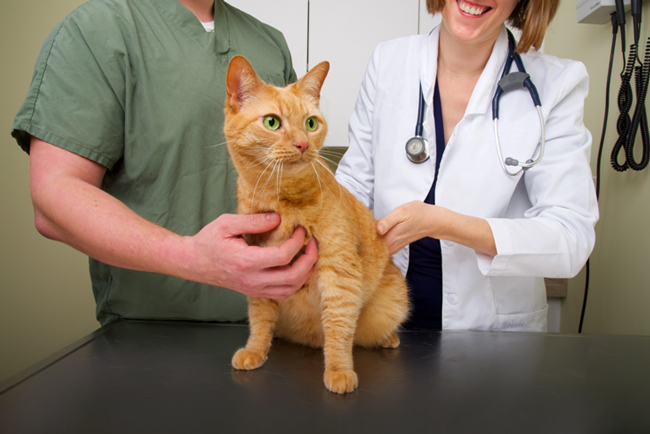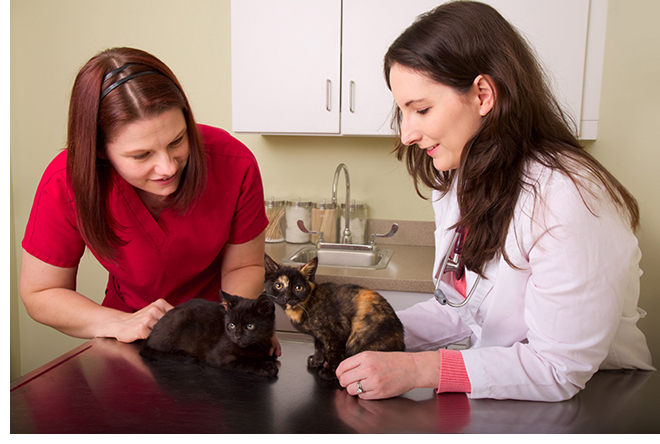
A Closer Look At The Cats We Help Care For
November 8, 2016
Continuing our series about the animals we care for, let’s take a closer look at our feline friends-- cats.
Continuing our series about the animals we care for, let’s take a closer look at our feline friends-- cats.
Have you ever tried to give a cat a pill? It’s not the same as giving medicine to any other pets. At Zoetis, we know what cat owners know – cats are not small dogs; they have their own unique needs.
Common diseases
 Diseases common in cats are different than diseases common in dogs. Viral diseases common in cats include Feline Leukemia Virus (FeLV) and Feline Immunodeficiency Virus (FIV), which can be passed from cat to cat. Because cats are natural hunters, they are exposed to parasites when hunting such as Toxoplasma gondii which causes toxoplasmosis. Cats are also more prone to suffer from renal or kidney disease. More than 30% of cats get kidney disease at some point in their lives, and for the oldest cats this increases to 50%.1 The most common feline bacterial diseases are skin abscesses, urinary tract infections, and upper respiratory infections.
Diseases common in cats are different than diseases common in dogs. Viral diseases common in cats include Feline Leukemia Virus (FeLV) and Feline Immunodeficiency Virus (FIV), which can be passed from cat to cat. Because cats are natural hunters, they are exposed to parasites when hunting such as Toxoplasma gondii which causes toxoplasmosis. Cats are also more prone to suffer from renal or kidney disease. More than 30% of cats get kidney disease at some point in their lives, and for the oldest cats this increases to 50%.1 The most common feline bacterial diseases are skin abscesses, urinary tract infections, and upper respiratory infections.
Cats are not dogs
Cats and dogs do share some health conditions—such as diabetes, flea and tick infestations, and certain bacterial infections— but these can affect the two species differently.
An example of a disease affecting cats and dogs differently is osteoarthritis. Veterinarians have long treated the disease in dogs, but it was not frequently treated in cats. However, veterinarians saw evidence of osteoarthritis in cats x-rayed for other conditions, which led to the discovery that osteoarthritis presents differently in cats and dogs. Instead of limping or having difficulty going up stairs, cats may spend more time on lower surfaces to avoid jumping or struggle with using the litterbox.
“Cats are masters at hiding their disease from us. Unless you are trained to look for it, you are not going to know what to see,” said Dr. Theodore J. Cohn, DVM, and Past President of the American Veterinary Medicine Association (AVMA).
Part of the challenge is in normal cat behavior. Cats are solitary, nocturnal, and like to hide, all of which makes detecting disease difficult.


Meeting unmet needs
Regular veterinary care is one of the most important needs of cats. Even though cats equal or outnumber dogs in many places around the world2, they often visit the veterinarian less frequently. Routine veterinary visits can uncover unseen health conditions in cats. A recent study showed that middle-aged and older cats, despite appearing healthy, are found to have abnormalities when physically examined or undergoing laboratory tests3.
Zoetis is doing our part to make caring for cats easier. We are working to make feline medicines easier to administer and longer-acting. One example is CONVENIA®, which is an antibiotic administered in a single injection in the veterinary clinic instead of multiple days of pills. CONVENIA acts rapidly to provide up to 14 days of treatment for bacterial skin infections in cats.
Diverse product portfolio
Zoetis offers a diverse portfolio of vaccines, anti-infectives, and medicines to help cats enjoy long and healthy lives. Below is a brief sampling of our feline products:
-
Convenia® (cefovecin sodium) - The first anti-infective for the treatment of common bacterial skin infections in cats that provides an entire course of treatment in a single injection.
-
Cerenia® (maropitant citrate) - An antiemetic to treat and prevent acute vomiting, it comes in an injectable formulation.
-
Clavamox®/Synulox® - A broad-spectrum anti-infective and the first and only potentiated penicillin approved for use in cats and comes in tablets and as flavored, oral drops.
-
Dexdomitor® (dexmedetomidine hydrochloride) - A sedative and analgesic to facilitate clinical examinations, clinical procedures, minor surgical procedures, and minor dental procedures.
-
Revolution® / Stronghold® (selamectin) - A medicine that protects against adult fleas, prevents fleas from hatching, heartworm, ear mites and other parasites such as roundworms and hookworms. It is administered via a liquid applied between the shoulder blades rather than pilling.
-
Fungassay® - A convenient, in-house culture medium that provides a simple, rapid, and practical method for confirming diagnosis of dermatophyte infections.
- Simbadol® (buprenorphine injection) - The first and only FDA approved buprenorphine specifically designed for cats. A novel combination of dose and concentration administered subcutaneously, SIMBADOL is a once-daily, 24 hour continuous surgical pain control. Demonstrated safety and efficacy in more than 200 cats, clinics can provide up to 3 once daily subcutaneous doses for a total of 72 hours of pain control.
The future of feline health
 In the past, cats were underrepresented in animal health. Many more products are currently registered for dogs than for cats. Zoetis is working to change that. We are considering the needs of cats in our research and development. This focus has led to market-leading
In the past, cats were underrepresented in animal health. Many more products are currently registered for dogs than for cats. Zoetis is working to change that. We are considering the needs of cats in our research and development. This focus has led to market-leading
products such as Revolution for Cats and Convenia. For the future, our scientists are working on possible products for cats that will advance treatment options into the 21st century.
We are also talking to our cat customers. Zoetis has organized forums with feline experts in academia and specialty practices to discuss the future of cat health. We have asked cat owners for feedback through our Cat Quality of Life survey to learn about healthy cats’ quality of life. Zoetis launched the Pet Wellness Report which combines breed-specific healthcare information with at-home observations to engage, educate, and empower cat owners to care for their cat in partnership with their veterinarian. Learning more about feline health allows us to make better medicines that meet the needs of cats.
Learn more
To learn more about feline health at Zoetis, check out some of our initiatives dedicated to cats.
-
Catisphere, our Facebook page for sharing our love of cats and their wellbeing
-
The Pet Wellness Report, an online questionnaire for cat owners that helps identify possible health risks
-
Zoetis for Shelters, a community for animal shelters which shares information about caring for cats